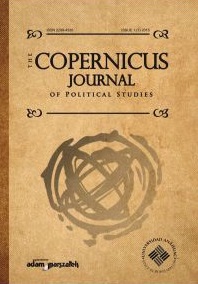External Factors Determining the Electoral Strategies of Political Parties in Multi-Level Systems
DOI:
https://doi.org/10.12775/cjps.2014.01.03Słowa kluczowe
electoral strategies, political parties, multi-level system, party organisation, regionalisationAbstrakt
This article identifies the factors which determine the electoral strategies of political parties in multi-level systems and describes how they can influence these strategies. It particularly focuses on the two aspects: regionalisation and “nationalisation” (centralisation) of the strategies. In the first case, state-wide parties allow their regional branches to develop their own strategies, in the second one – the regional strategies are dominated by the strategies of statewide parties. The article shows the features of political systems that foster each of these cases, especially the way in which a multi-layered system is created (bottom-up, top-down), the relations between the state authorities at central and regional levels (connected, separated), electoral systems and cycles.
Bibliografia
Bay Brzinski, J. (1999). Changing Forms of Federalism and Party Electoral Strategies: Belgium and the European Union. Publius: The Journal of Federalism, 29(1), pp. 45–70.
van Biezen, I. & Hopkin, J. (2006). Party organisation in multi-level contexts. In D. Hough & C. Jeffery (Eds.), Devolution and electoral politics (pp. 14–36). Macherster, New York: Manchester University Press.
Caramani, D. (2004). The Nationalization of Politics. The Formation of National Electorates and Party Systems in Western Europe, Cambridge: Cambridge University Press.
Chhibber, P. & Kollman, K. (2004). The Formation of National Party Systems. Federalism and Party Competition in Canada, Great Britain, India and the United States, Princeton, Oxford: Princeton University Press.
Deschouwer, K. (2000). The European Multi-level Party Systems. Towards a Framework or Analysis, EUI Working Papers, 47/2000. Retrieved from http://www.eui.eu/RSCAS/WP-Texts/00_47.pdf (20.06.2010), pp. 1–35.
Deschouwer, K. (2003). Political Parties as Multi-Layered Systems. European Urban and Regional Studies, 10(3), pp. 213–226.
Deschouwer, K. (2006). Political Parties as Multi-Level Organisations. In R.S. Katz & W. Crotty (Eds.), Handbook of party politics (pp. 291–300). Los Angeles, London, New Delhi, Singapore, Washington DC: Sage Publications.
Detterbeck, K. (2012). Multi-Level Party Politics in Western Europe. Basingstoke, New York: Palgrave Macmillan.
Fabre, E. (2008). Party Organization in a Multi-level System: Party Organizational Change in Spain and the UK. Regional & Federal Studies, 18(4), pp. 309–329.
Gagatek, W. (2009). European Political Parties as Campaign Organisations: Towards a Greater Politicisation of the European Parliament Elections. Brussels: Centre for European Studies.
Hepburn, E. (2010), Using Europe: territorial party strategies in a multi-level system. Manchester: Manchester University Press.
Hough, D. & Jeffery, C. (2006). Germany: an erosion of federal- Länder linkages? In D. Hough & C. Jeffery (Eds.), Devolution and electoral politics (pp. 119–139). Macherster, New York: Manchester University Press.
Hooghe, L., Marks, G. & Schakel, A.H. (2010). The Rise of Regional Authority: A Comparative Study of 42 Democracies. London: Routledge.
Kustra, A. (2007). Reforma federalizmu w Niemczech. Geneza. Cele. Podstawowe założenia. Przegląd Sejmowy, 78(1), pp. 205–214.
Pawłowski, G. (2003). Zarządzanie strategiczne partią polityczną. In W. Sokół & Reif, K. & Schmitt, H. (1980). Nine second-order national elections: a conceptual framework for the analysis of European elections results. European Journal of Political Research, 8(1), pp. 3–44.
Sarnecki, P. (2008). Ustroje konstytucyjne państw współczesnych. Warszawa: Wolters Kluwer.
Schakel, A.H. (2013). Nationalisation of multilevel party systems: A conceptual and empirical analysis. European Journal of Political Research, 52(2), pp. 212–236.
Schakel, A.H. & Dandoy R. (Eds.) (2013). Regional and National Elections in Western Europe. Territoriality of the Vote in Thirteen Countries. London: Palgrave.
Sigalas, E. & Pollak, J. (2011). Parties at the European Level: Do They Satisfy the Condition of Programmatic Convergence? In S. Kröger & D. Friedrich (Eds.), The Challenge of Democratic Representation in the European Union (pp. 23–40). Basingstoke: Palgrave Macmillan.
Sobolewska-Myślik, K. (2011). Rywalizacja partyjna w sytuacji decentralizacji systemu politycznego – zarys problemu. The paper presented at the conference: Referat wygłoszony na ogólnopolskiej konferencji naukowej Partie polityczne przełomu XX i XXI wieku. Kondycja, kierunki rozwoju i perspektywy, zorganizowanej przez Katedrę Systemu Politycznego RP, Wydział Politologii i Studiów Międzynarodowych UMK, PTNP, Lubostroń 21–22.09.2011.
Stobiński, M. (2013). Strategie partii politycznych w kampaniach wyborczych w Polsce, Czechach, na Słowacji i Węgrzech. Academia.edu. Retrieved from http://www.academia.edu/1986593/Strategie_partii_politycznych_w_kampaniach_wyborczych_w_Polsce_Czechach_na_Slowacji_i_Wegrzech.
Swenden, W. & Maddens, B. (Eds.) (2009). Territorial Party Politics in Western Europe. Basingstoke and New York: Palgrave Macmillan.
Wiszniowski, R. (2000). Marketing wyborczy. Warszawa–Wrocław: Wydawnictwo Naukowe PWN.
Wyciślak, S. & Kosowska-Gąstoł, B. (2010). Zastosowane elementów teorii i zarządzania w badaniach nad partiami politycznymi. Politeja, 14(2), s. 410–434.
Żmigrodzki (Eds.), Współczesne partie i systemy partyjne (pp. 85–107). Lublin: Wydawnictwo Uniwersytetu Marii Curie Skłodowskiej.
Pobrania
Opublikowane
Jak cytować
Numer
Dział
Statystyki
Liczba wyświetleń i pobrań: 322
Liczba cytowań: 0



